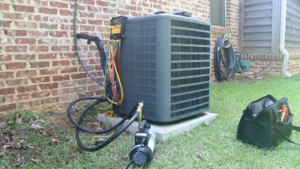
How Does an AC Compressor Work?
Compressors work in phases. First, refrigerant enters through the inlet valve and flows into a piston cylinder. Then the cylinder squeezes the gas, decreasing its volume until it converts into a liquid. Finally, the liquid is forced out through the discharge valve into the condenser coils, where its excess heat is diffused with the help of a fan that draws air through the unit.
Common Issues
Despite their robust construction, AC compressors can encounter problems. Most begin as minor issues that escalate over time, significantly shortening the life of your air conditioner. Some of the most frequent difficulties encountered by homeowners are:
- Lack of Lubrication. Without proper lubrication, the metal components inside the compressor will begin to grind on one another, generating excessive heat and friction that wears down components at an accelerated rate.
- System Contamination. Due to poor servicing and installation, dirt, air, sludge, and moisture can enter the system and degrade refrigerant, obstruct circulation, and damage internal components.
- Electrical Problems. Burnt wires, voltage fluctuations, defective relays, and faulty capacitors can overheat the unit or lead to failure.
- Low Refrigerant. Compressors rely on refrigerant to dispel heat generated by the compression process. Low refrigerant also increases the compressor’s load, eventually leading it to overwork.
- Refrigerant Floodback. When the air conditioner is overcharged, liquid refrigerant can flow back into the compressor. Besides reducing efficiency, floodback can also increase mechanical stress and wash away lubricating oil.
How to Extend the Lifespan of Your Compressor
Regular maintenance is the best way to ensure the longevity of your AC compressor. Air conditioners should be serviced at least once a year, perhaps twice a year in environments with extreme temperatures. A certified HVAC technician not only helps monitor the unit’s performance, but repairs any damage they might find as well. Besides cleaning and lubricating the compressor, they’ll also check the filters, capacitor, ventilation, and electrical connections. More importantly, they’ll measure refrigerant levels to make certain the system has not sprung a leak.
In addition to maintenance, homeowners should make sure the system is not suffering from overuse, which accelerates wear and tear, or underuse, which dries out seals, motors, and pistons, causing them to wear out or seize up.
Because most homeowners have no trouble running their air conditioner periodically, underuse is rarely a problem. The best way to prevent overuse is by raising the setting on your thermostat, so it’s never more than 20°F below the temperature outside. You can also follow some of our energy saving tips and experiment with alternate ways of staying cool during the mornings and evenings, when the heat’s less intense.
Save on AC Repairs with EnergyGuardTM
The compressor is one of the most critical and expensive parts of your air conditioner. Don’t let an unexpected repair upset your monthly budget. Protect yourself with Agway’s EnergyGuardTM Program, which covers your heating, cooling, and electrical systems from damage caused by wear and tear.
When the need for repair occurs, our customers don’t waste time hunting for a qualified technician. They call us. We schedule an appointment with a contractor in your area and pay for all covered parts. And unlike other home repair programs, we don’t charge service fees or deductibles. Safeguard your finances. Sign up and start enjoying the benefits of EnergyGuardTM today!